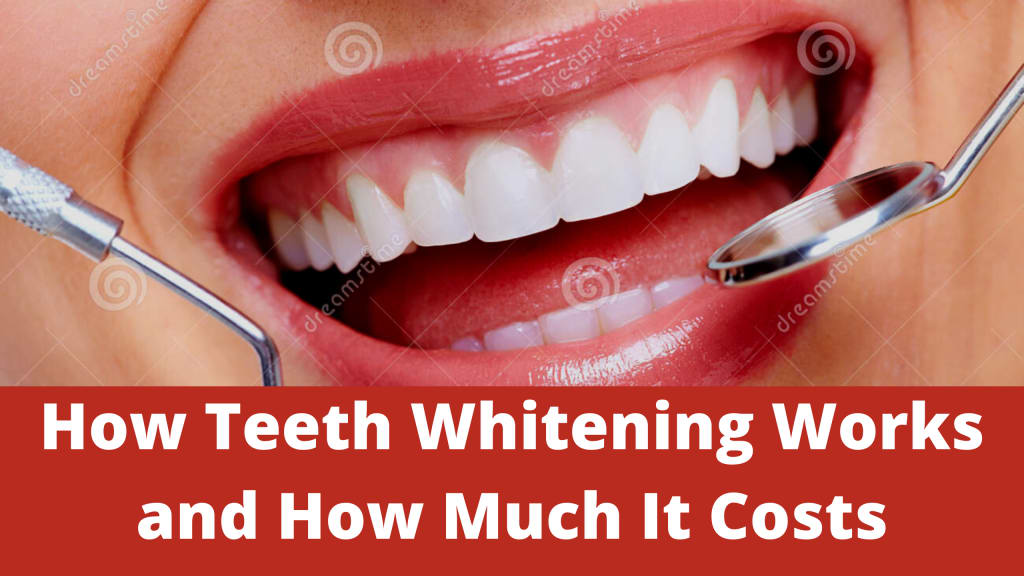How Teeth Whitening Works and How Much It Costs
teeth whitening is the most expensive

One of the most common cosmetic dentistry procedures is teeth whitening, which offers a quick, non-invasive, and reasonably priced approach to improve a smile. Every budget, time limit, and temperament can be satisfied by whitening (or bleaching) procedures, which are universally valued by both men and women. Solutions abound, whether they come in the shape of professionally performed one-hour whitening sessions at a dental clinic or cosmetic salon, or home-use bleaching kits bought at your neighborhood drugstore.
Almost everyone who chooses a teeth whitening method notices a moderate to significant increase in the brilliance and clarity of their smile. Nevertheless, it is a temporary fix for discolouration and calls for upkeep or "touch-ups" for a lasting look.
The process of tooth discoloration, what causes staining, the numerous treatment techniques available, and their associated risks and costs are all covered in detail in this article.
What Is the Difference Between Bleaching and Whitening?
The FDA states that the term "bleaching" may only be used when teeth can be made noticeably whiter than their original color. This only applies to goods that include hydrogen peroxide or carbamide peroxide, which is the active ingredient in bleach.
On the other hand, the term "whitening" describes the process of restoring a tooth's surface color by removing debris and stains. Therefore, in a strict sense, any item that is used to clean the teeth (such as toothpaste) is regarded as a whitener. Even when describing goods that contain bleach, the term "whitening" is more usually used because it sounds better than "bleaching."
When time is at a premium during in-office whitening, strong, quick-acting hydrogen peroxide is the preferred bleach. Concentrations of hydrogen peroxide used to whiten teeth can range from nine to forty percent.
In contrast, slower-acting carbamide peroxide, which decomposes into hydrogen peroxide, is the bleach of choice for at-home teeth whitening. The strength of carbamide peroxide is about one-third that of hydrogen peroxide. This indicates that a carbamide peroxide solution at 15 percent is about similar to a hydrogen peroxide solution at 5 percent.
How white is too white? A Concern for Beauty
Results are arbitrary and greatly vary from person to person. While some people are ecstatic with their results right away, others could be disappointed. Ask your dentist for a realistic estimate of the outcomes you are likely to get and how long it should take you to accomplish them before beginning any whitening treatment.
Risks
When operations are carried out as instructed, teeth whitening treatments are thought to be safe. Nevertheless, there are a few hazards connected to bleaching that you should be aware of:
Sensitivity: Temporarily elevated sensitivity to pressure, warmth, and touch can be brought on by bleaching. This is more likely to happen when bleach with a higher concentration is used for in-office whitening. Some people have zingers, or sudden shooting pains, down the middle of their front teeth. Those who have gum recession, major fissures in their teeth, or leaking as a result of poor restorations are most susceptible to whitening discomfort. Risks
When operations are carried out as instructed, teeth whitening treatments are thought to be safe. Nevertheless, there are a few hazards connected to bleaching that you should be aware of:
When operations are carried out as instructed, teeth whitening treatments are thought to be safe. Nevertheless, there are a few hazards connected to bleaching that you should be aware of:
Sensitivity : Bleaching might temporarily make you more sensitive to touch, pressure, and temperature. This is more likely to happen when bleach with a higher concentration is used for in-office whitening. Some people have zingers, or sudden shooting pains, down the middle of their front teeth. Those who have gum recession, major fissures in their teeth, or leaking as a result of poor restorations are most susceptible to whitening discomfort. Additionally, it has been noted that redheads, even those without any other risk factors, are particularly susceptible to tooth sensitivity and zingers. Whitening sensitivity usually only lasts for a day or two, but it occasionally can last for a whole month. For patients with sensitive teeth, some dentists suggest using toothpaste with potassium nitrate.
Gum inflammation: Due to the bleach concentration or contact with the trays, more than half of people who use peroxide whiteners develop gum irritation to some extent. The irritation usually subsides after bleaching is stopped or the peroxide content is reduced and can linger for a few days.
Technicolor teeth: Because bleach does not effect restorations like bonding, dental crowns, or veneers, they retain their natural color as the teeth around them whiten. This leads to what are known as "technicolor teeth."

How much does it cost to whiten teeth?
The price of teeth whitening might vary quite a little from one product to another and one method to another.
The most expensive alternative is professional, in-office teeth whitening, which costs, on average, $650 per visit but can cost up to $1,000. However, it does have the advantage of being carried out by a skilled dental expert, assisting in ensuring that you obtain the results you're after.
Over-the-counter strips and trays that you may get at your neighborhood drugstore or grocery shop are at the other end of the price spectrum. These kits, which can cost anywhere from $20 to $100, are an appealing alternative for people wishing to improve their smiles slightly without incurring the exorbitant cost of in-office whitening. However, it's crucial to remember that outcomes can differ greatly when using these less expensive, low-concentration peroxide whiteners.
Take-home kits that are professionally dispensed may be a good option for you if you're searching for something in the midst of professional whitening and over-the-counter solutions. These kits, which can cost between $100 and $400 and are prescribed by a dentist, may be able to produce outcomes that are comparable to those you would receive from a dentist in-office.






Comments
There are no comments for this story
Be the first to respond and start the conversation.